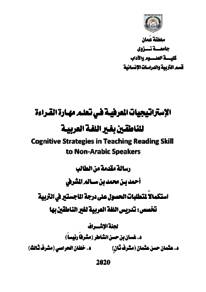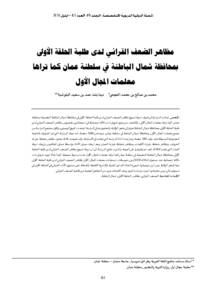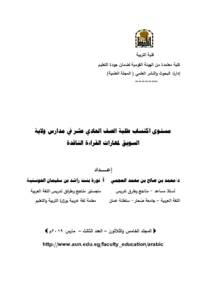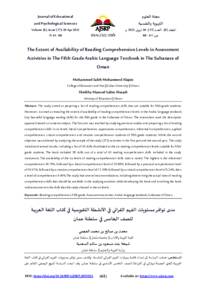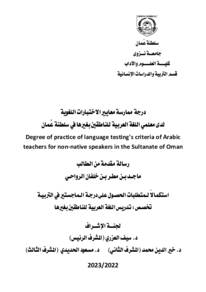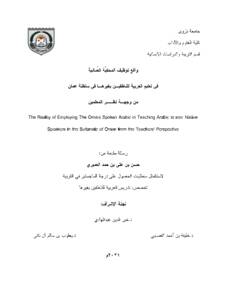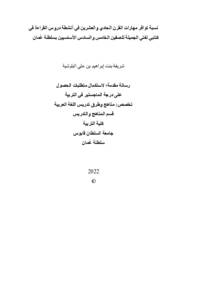Document
الإستراتيجيات المعرفيـة فـي تعلـم مهـارة القـراءة للناطقـين بغـير اللغـة العربيـة.
Publisher
جامعة نزوى.
Gregorian
2020
Language
Arabic
Subject
English abstract
This study aimed to identify the most common cognitive strategies in learning the reading skill of non-Arabic speakers, the role of these cognitive strategies in learning the reading skill for non-Arabic speakers, the difficulties faced by Arabic language learners for non-native speakers while reading, and how to overcome difficulties. To achieve the aims of the study, the researcher used the descriptive analytical method, and adopted the questionnaire as a study tool. Where the researcher collected data through individuals who intentionally sample some of the Arabic language teaching institutions for non-native speakers in the Sultanate of Oman, whose number is estimated at forty one male and female students for the academic year (2018-2019). The study tool consisted of a questionnaire that included a number of paragraphs related to patterns of cognitive strategies in learning the reading skill of non-native speakers. After applying the study tool, extracting the results and statistically treating them. The researcher reached the following results:
In terms of the patterns of cognitive strategies most commonly used to learn reading skills for non-Arabic speakers,Social strategies came first, with a high standard, and a general arithmetic average (3.72). The cognitive strategies came in the second place with a moderate level and a general arithmetic average (3.37). Then the memorial strategies ranked third with a moderate level and a general arithmetic average (3.18). The compensatory strategies came in fourth place with a moderate level, and with a general arithmetic average (3.09). Then emotional strategies came in the fifth rank with a moderate level and a general arithmetic average (3.02).Mental strategies came in the last place with a moderate level and a general arithmetic average (2.95).
The results also showed that the role of cognitive strategies in learning the reading skill for non-Arabic speakers, It came with a moderate level, and a general arithmetic average (3.31). Then, how to overcome the difficulties faced by non-Arabic speakers while reading the Arabic language, came at a moderate level,General mean arithmetic (2.92), Moreover, the difficulties faced by non-Arabic speakers while reading the Arabic language came at a moderate level and with a general arithmetic average (2.68). Finally, the study showed that there are no statistically significant differences in the level of cognitive strategies used in learning the reading skill for non-Arabic speakers, due to gender, age, educational level, or places of study.In light of the previous results, the study reached a set of recommendations, the most prominent of which are:
• The necessity of directing teachers of Arabic language to non-native speakers to use teaching strategies appropriate to the learning strategies of these students.
• Calling for training courses for non-native speakers in universities in the Sultanate of Oman to address strategies for learning the Arabic language.
Arabic abstract
هدفت هذه الدراسة إلى التعرف على أنماط الإستراتيجيات المعرفية الأكثر شيوعا في تعلم مهارة القراءة للناطقين بغير اللغة العربية، ودور تلك الإستراتيجيات المعرفية في تعلم مهارة القراءة للناطقين بغير اللغة العربية، والصعوبات التي يواجهها متعلمو اللغة العربية غير الناطقين بها أثناء القراءة، وكيفية التغلب على الصعوبات. ولتحقيق أهداف الدراسة استعمل الباحث المنهج الوصفي التحليلي، واعتمد الاستبانة أداة للدراسة؛ حيث قام الباحث بجمع البيانات من خلال أفراد عينة قصدية من بعض مؤسسات تعليم اللغة العربية للناطقين بغيرها في سلطنة عمان، والبالغ عددهم بواحد وأربعين طالبا وطالبة للعام الدراسي (2018-2019).
تمثلت أداة الدراسة في استبانة تضمنت عددا من الفقرات المتعلقة بأنماط الإستراتيجيات المعرفية في تعلم مهارة القراءة للناطقين بغيرها، ودور الإستراتيجيات المعرفية في تعلم مهارة القراءة للناطقين بغيرها، والصعوبات التي يواجهها الناطقون بغير العربية أثناء قراءة اللغة العربية، كيفية التغلب على الصعوبات. وبعد تطبيق أداة الدراسة، واستخراج النتائج، ومعالجتها إحصائيا. توصل الباحث إلى النتائج الآتية:
من حيث أنماط الإستراتيجيات المعرفية الأكثر شيوعا في تعلم مهارة القراءة للناطقين بغير اللغة العربية،
جاءت الإستراتيجيات الاجتماعية في المرتبة الأولى، بمستوى مرتفع، وبمتوسط حسابي عام (3.72)، وجاءت الإستراتيجيات فوق المعرفية في المرتبة الثانية بمستوى معتدل، وبمتوسط حسابي عام (3.37)، ثم جاءت الإستراتيجيات التذكرية في المرتبة الثالثة بمستوى معتدل، وبمتوسط حسابي عام (3.18)، وجاءت الإستراتيجيات التعويضية في المرتبة الرابعة بمستوى معتدل، وبمتوسط حسابي عام (3.09)، ثم جاءت الإستراتيجيات الوجدانية في المرتبة الخامسة بمستوى معتدل، وبمتوسط حسابي عام (3.02)، وجاءت الإستراتيجيات الذهنية في المرتبة الأخيرة بمستوى معتدل، وبمتوسط حسابي عام (2.95).
كما أظهرت النتائج أن دور الإستراتيجيات المعرفية في تعلم مهارة القراءة للناطقين بغير اللغة العربية، جاءت بمستوى معتدل، وبمتوسط حسابي عام (3.31)، ثم كيفية التغلب على الصعوبات التي يواجهها الناطقون بغير العربية أثناء قراءة اللغة العربية وجاءت بمستوى معتدل، وبمتوسط حسابي عام (2.92)، ثم الصعوبات التي يواجهها الناطقون بغير العربية أثناء قراءة اللغة العربية وجاءت بمستوى معتدل، وبمتوسط حسابي عام (2.68).
وأخيرًا أظهرت الدراسة أنه لا توجد فروق ذات دلالة إحصائية في مستوى الإستراتيجيات المعرفية المستخدمة في تعلم مهارة القراءة للناطقين بغير العربية تعزى إلى النوع الاجتماعي،
أو العمر، أو المستوى التعليمي، أو أماكن الدراسة.
وفي ضوء النتائج السابقة توصلت الدراسة إلى مجموعة من التوصيات، أبرزها:
- ضرورة توجيه مدرسي اللغة العربية لغير الناطقين بها إلى استعمال إستراتيجيات تدريس تناسب إستراتيجيات تعلم هؤلاء الطلاب.
- الدعوة إلى عقد دورات تدريبية للطلبة غير الناطقين باللغة العربية في جامعات سلطنة عُمان تتناول إستراتيجيات تعلم اللغة العربية.
تمثلت أداة الدراسة في استبانة تضمنت عددا من الفقرات المتعلقة بأنماط الإستراتيجيات المعرفية في تعلم مهارة القراءة للناطقين بغيرها، ودور الإستراتيجيات المعرفية في تعلم مهارة القراءة للناطقين بغيرها، والصعوبات التي يواجهها الناطقون بغير العربية أثناء قراءة اللغة العربية، كيفية التغلب على الصعوبات. وبعد تطبيق أداة الدراسة، واستخراج النتائج، ومعالجتها إحصائيا. توصل الباحث إلى النتائج الآتية:
من حيث أنماط الإستراتيجيات المعرفية الأكثر شيوعا في تعلم مهارة القراءة للناطقين بغير اللغة العربية،
جاءت الإستراتيجيات الاجتماعية في المرتبة الأولى، بمستوى مرتفع، وبمتوسط حسابي عام (3.72)، وجاءت الإستراتيجيات فوق المعرفية في المرتبة الثانية بمستوى معتدل، وبمتوسط حسابي عام (3.37)، ثم جاءت الإستراتيجيات التذكرية في المرتبة الثالثة بمستوى معتدل، وبمتوسط حسابي عام (3.18)، وجاءت الإستراتيجيات التعويضية في المرتبة الرابعة بمستوى معتدل، وبمتوسط حسابي عام (3.09)، ثم جاءت الإستراتيجيات الوجدانية في المرتبة الخامسة بمستوى معتدل، وبمتوسط حسابي عام (3.02)، وجاءت الإستراتيجيات الذهنية في المرتبة الأخيرة بمستوى معتدل، وبمتوسط حسابي عام (2.95).
كما أظهرت النتائج أن دور الإستراتيجيات المعرفية في تعلم مهارة القراءة للناطقين بغير اللغة العربية، جاءت بمستوى معتدل، وبمتوسط حسابي عام (3.31)، ثم كيفية التغلب على الصعوبات التي يواجهها الناطقون بغير العربية أثناء قراءة اللغة العربية وجاءت بمستوى معتدل، وبمتوسط حسابي عام (2.92)، ثم الصعوبات التي يواجهها الناطقون بغير العربية أثناء قراءة اللغة العربية وجاءت بمستوى معتدل، وبمتوسط حسابي عام (2.68).
وأخيرًا أظهرت الدراسة أنه لا توجد فروق ذات دلالة إحصائية في مستوى الإستراتيجيات المعرفية المستخدمة في تعلم مهارة القراءة للناطقين بغير العربية تعزى إلى النوع الاجتماعي،
أو العمر، أو المستوى التعليمي، أو أماكن الدراسة.
وفي ضوء النتائج السابقة توصلت الدراسة إلى مجموعة من التوصيات، أبرزها:
- ضرورة توجيه مدرسي اللغة العربية لغير الناطقين بها إلى استعمال إستراتيجيات تدريس تناسب إستراتيجيات تعلم هؤلاء الطلاب.
- الدعوة إلى عقد دورات تدريبية للطلبة غير الناطقين باللغة العربية في جامعات سلطنة عُمان تتناول إستراتيجيات تعلم اللغة العربية.
Member of
Resource URL
Identifier
المشرفي, أحمد بن محمد (2020). الإستراتيجيات المعرفيـة فـي تعلـم مهـارة القـراءة للناطقـين بغـير اللغـة العربيـة (رسالة ماجستير، جامعة نزوى، نزوى، عمان).
Same Subject
